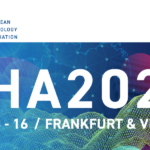
Harvard Medical School | HMS · Department of Medicine
The annual European Hematology Association (EHA) meeting was successfully held both online and offline from June 8th to 11th, 2023, local time, in Frankfurt, Germany. As the largest international conference in the European hematology field, it attracts over ten thousand professionals from more than 100 countries every year, sharing and discussing innovative ideas and the latest scientific and clinical research results in hematology. At this EHA meeting, Professor Amir Fathi from Harvard Medical School (HMS) presented orally on a project titled “Activity, Tolerability, and Resistance of menin Inhibitor Ziftomenib in Adult Relapsed/Refractory NPM1-Mutated Acute Myeloid Leukemia (AML) Patients”. Oncology Frontier invited Dr. Amir Fathi to interpret this research and the related developments in AML targeted therapy.
01
Oncology Frontier: Could you discuss the impact of the NPM1 mutation on the prognosis of AML patients and the value of the treatment?
NPM1 mutations are usually associated with a favorable prognosis in the frontline treatment. However, as mentioned in our talk, if the patient is older, has other concurrent mutations, and is in a relapsed and refractory situation, the prognosis for patients with NPM1 mutations is poor, showing a weaker therapeutic effect. Therefore, there is an urgent need for targeted therapy for NPM1 mutations to address this high unmet clinical need and improve the prognosis of these patients.
Oncology Frontier: Could you provide more details on the LB2713 study?
Ziftomenib is a potent inhibitor of the menin-KMT2A interaction. It down-regulates specific regulatory factors, such as HOX19 and MEIS1, prompting the differentiation of myeloid blasts into normal myeloid precursor cells, leading to clinical efficacy. In this Phase Ib study, we focused on relapsed/refractory patients with NPM1 mutations. We found that the treatment was well-tolerated in patients, with an overall response rate (ORR) of 45% and a complete remission (CR) rate of 35%. Further analysis is ongoing, and a Phase II study is currently underway. We will learn more as time goes on.
Oncology Frontier: Could you talk about other developments in targeted therapy at this conference? Is there any research that left a strong impression on you?
I believe the current treatment landscape for AML continues to evolve. Drugs in the menin inhibitor class have great potential. CD47/SIRPα targeting agents are also intriguing. There were some recent presentations on resistance to menin inhibitors at this congress that I found very intriguing. So, this congress was quite significant, and we learned of some recent developments both here and at other global meetings.



